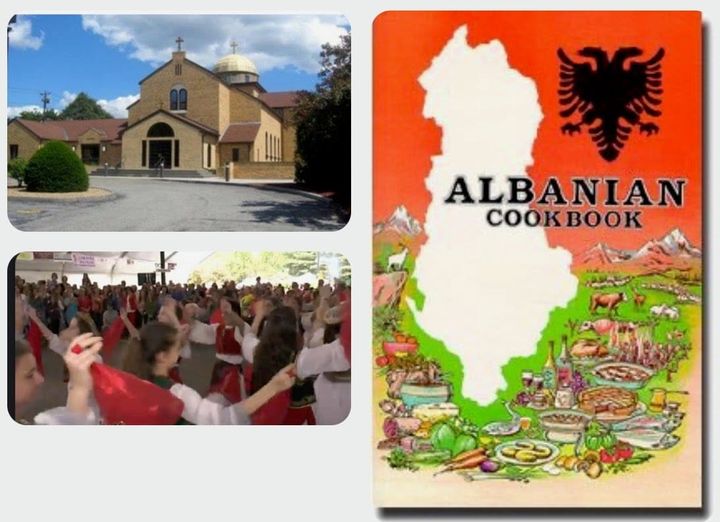
Rafaela Prifti/
Carol Laska is a veteran of the Worcester Albanian Festival. Born in NYC to Albanian parents, she lived there until she was five years old before making her home in Worcester “for the rest of her life”. Her whole family is from this central Massachusetts town where Albanians have settled from early 20th century. With a sizeable community estimated to be close to 20,000 comes the keeping of such Albanian traditions like cooking, music, the folk dances, as ways of honoring and passing down the heritage to the next generation. The Albanian Orthodox Church of St. Mary’s Assumption of Worcester is known as the birthplace and main organizer of the three-day event “production” that is held every alternate year since 1983. After a four-year gap due to Covid restrictions, this year’s event again gathered Albanians from near and far as well as locals on the Church’s property on 535 Salisbury Street. The Worcester Telegram and Gazette writes: “Local folks enjoyed a weekend visit to Albania without leaving town….the event which ends Sunday is the oldest and largest Albanian festival in the US.”
How did it all start and why does it go on? To get some answers about what the event meant for Albanians then and what brings them back here, I spoke to the unofficial Festival Veteran, Carol Laska. I found her by the entrance of St. Mary’s. She was carrying copies of the Albanian Cookbook from the storage room to the kiosk set up at the church courtyard. Starting in 1983 and working continuously since then, Carol Laska said that the first festivals were held on the Church’s property downtown at Mechanics Hall. “It was a bazaar as we called it and all the ladies prepared the food and did crafts like on Christmas or holidays,” she recalls.
I asked Carol how the idea of the festival came to be in the first place. She said the idea stemmed from the desire to serve the city of Worcester. “We have always done bazaars and fairs very well, which, at first, were one day events. How else can we serve the city? With the first festival, suddenly, we became part of the city’s culture scene. People knew about Albanian food, and we would alternate with the Greek cooking.” She believes that what brings everybody in, apart from the delicacies and ethnic dishes is the comradery. “They all come to meet family members and relatives,” says Carol. She remembers that her own family who is originally from Worcester would ask each other: “Are you going to come? And they would all meet here.” At first the fundraiser venue was by the building which was located on Wellington Avenue, downtown Worcester.”
Her early memories of the bazaars are integrated with the stories her family has told her and the accounts of the former chairs of the Church. “The first ones went very well, and we raised money for the church so the St. Mary’s Assumption Albanian Orthodox church could stay open.”
I wondered which festival of which year stood out to Carol, in the 40-year period of holding the event. Ms. Laska said that it was the integration of the dances in the last twenty years or so. The young generation learning the Albanian steps was an important part of the culture that was embraced by the festival and organizers. “The families want their children to learn the dances. Originally, it started by the men and women who were part of the dance group. Seeing members dressed up in traditional Albanian costumes added vibrancy and color to the gathering,” said Carol.
Since Worcester Albanians have settled for over a century, I posed a question of the community’s dynamic in the context of the church fundraiser. With the new wave of immigrants coming in from Albania after the collapse of the previous system in the 90s, the newcomers found the festival to be a link between generations while being an expression of Albanian hospitality. “They wanted to be part of the community and getting involved with the festival was one way of doing it,” she indicated. That brings up an important point in our conversation. Although St. Mary’s Assumption is an Orthodox Church and most expats and members are from Southern towns like Korca, villages like Dardha and surrounding area, Carol points out that there is a large portion of Albanians who are Muslim. But being Albanian is the main theme. “It is a cultural center. They all meet here at different holidays and that is the way it has always been.”
Carol Laska has been on the Board of the Church for a few years. Currently, she is also very proud to continue with her duties as the Chairperson of the Albanian Cookbook. While holding the reprints in her hands, she says that “the book of was put together by all the little ladies who made sure to write down the recipes and measurements of the Albanian delicious dishes,” for posterity.